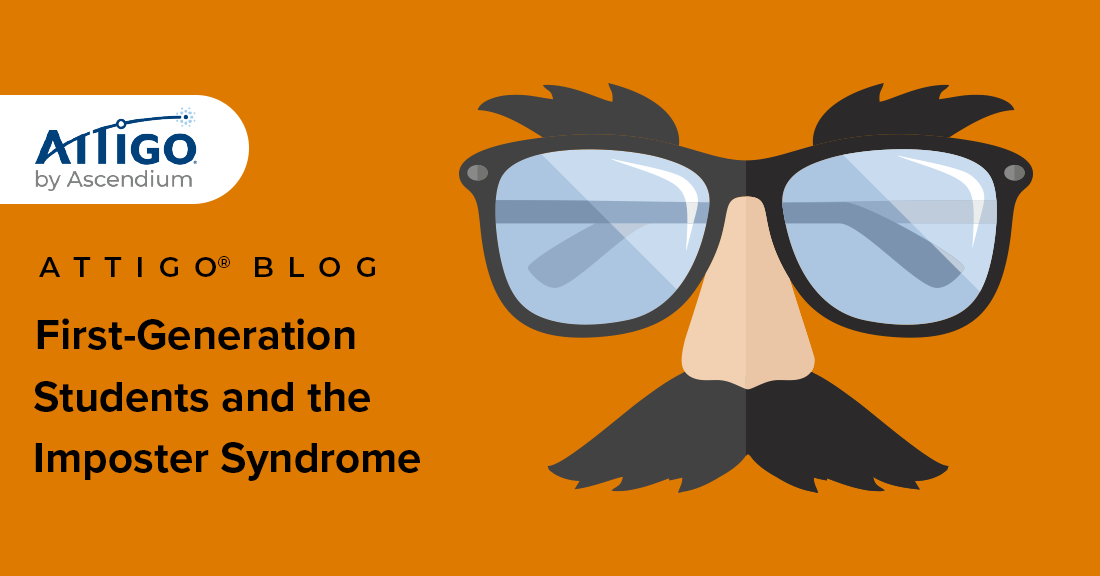The Imposter Syndrome and First-Generation Students

With a new fall term on the horizon we want to re-share a popular post in case you missed it. The upcoming academic year will weave together new beginnings, new classes, and a new group of first-generation (first-gen) students. As exciting as this is, some will likely face mixed emotions and feel out of place, especially first-gen students who may have missed out on 1:1 personalized support in the past year.
Apprehension, self-doubt and lack of college knowledge can influence behavior and performance. Feeling overwhelmed, concerned about next steps, or confusion about who to turn to for help can exacerbate these issues.
There are numerous ways to identify first-gen students, but most schools rely on self-reporting, usually via the Free Application for Federal Student Aid (FAFSA) or an institutional form. How does your institution define these students? How congruent is it to the way your students are self-identifying? Oftentimes, there’s a gap between the two and students can easily slip into that space between. One article in the New York Times asked, “Are you first-gen? Depends on who’s asking.” This emphasizes an important point "to figure out what first-gen really means," especially in regard to the goals of higher education. Schools then need to know what they’re going to do with the definition.
First-Gen Diversity

I listened to a TEDx talk done by Todd Hibbs, Alma College Wrestling Coach, who defined first-gen college students as “those who blaze a courageous and new college path, beyond that of their parents.” He highlights some of the challenges and obstacles they often face. I could see myself in much of what he described as I, too, was a first-gen student. There are various facets to being one. For example, a coworker and I were both first-gen students. I came from a low-income family while she did not. She lived on campus, I lived at home. Yet, we faced similar issues regarding not understanding the collegiate culture, managing expectations, and where to turn for help when it was needed.
In one instance, I vividly recall overhearing students in class discussing “pre-reg.” I had no idea that was an acronym for early registration for the next term and I ended up not getting into a course I wanted because it was full by the time I registered. What else didn’t I know? I was filled with uncertainty. Was it going to impact my financial aid? What other missteps was I making? Was this really for me? Did I even deserve to be here? Panic crept in while self-sabotaging thoughts swirled around my head. While I didn’t realize the name for it, I was experiencing the “imposter syndrome.”
Imposter Syndrome
 When I read “How Imposter Syndrome Holds Back First-Generation College Students,” I realized how common this feeling is. According to the article, “Imposter syndrome is basically believing that you don’t belong or don’t deserve to be somewhere; the sensation often leads to anxiety or depressive thoughts about whether the person can keep up.”
When I read “How Imposter Syndrome Holds Back First-Generation College Students,” I realized how common this feeling is. According to the article, “Imposter syndrome is basically believing that you don’t belong or don’t deserve to be somewhere; the sensation often leads to anxiety or depressive thoughts about whether the person can keep up.”
Some first-gen students may not quickly transition to college. It’s easy to feel isolated and alone. One student interviewed by ABC News said, “I never had anyone explain what it was going to be like” and “You feel the only reason you are there is because somebody made a mistake.”
Create Connections
To help alleviate the imposter syndrome, first-gen students may need help feeling a connection to the institution—a sense of belonging.
 Take proactive measures and strategies to increase chances of success, such as additional touch points and support mechanisms to facilitate aligning their goals and visions.
Take proactive measures and strategies to increase chances of success, such as additional touch points and support mechanisms to facilitate aligning their goals and visions.- Invite upperclassmen who are also first-gen students to act as mentors.
- Talk about their student experience — early and often. Are they feeling disconnected? Did they have a positive onboarding experience? Are they familiar with student organizations on campus? Do they know where to receive academic assistance, if needed?
One study indicated that “for every meeting with an advisor the odds that a student is retained increases by 13%. Furthermore, the findings support key elements of higher-education retention theories, specifically that student interaction, engagement, and involvement prove instrumental in keeping students enrolled.” The article went on to “advocate that colleges and universities recognize the unique needs of first-generation students and make academic advising a priority for them.” Helping students to overcome obstacles such as imposter syndrome can increase their opportunities for a successful, robust and rewarding academic career.
ABOUT THE AUTHOR

Michiale Carney
Senior Trainer - Michiale has over 40 years of experience in learning and development, higher education, and sales. She was a former director of financial aid with a Master in Higher Education Administration degree from the University of Toledo. Michiale is also an Accredited Financial Counselor with the Association of Financial Counseling and Planning Education (AFCPE). Her background as a financial aid director and sales manager enables her to bring real-world experiences to Ascendium’s curriculum training programs.